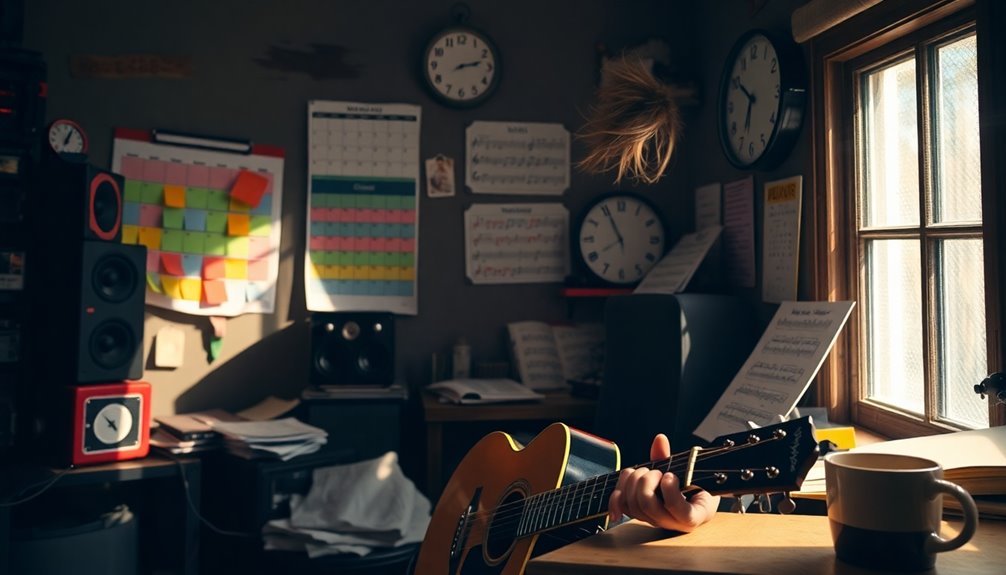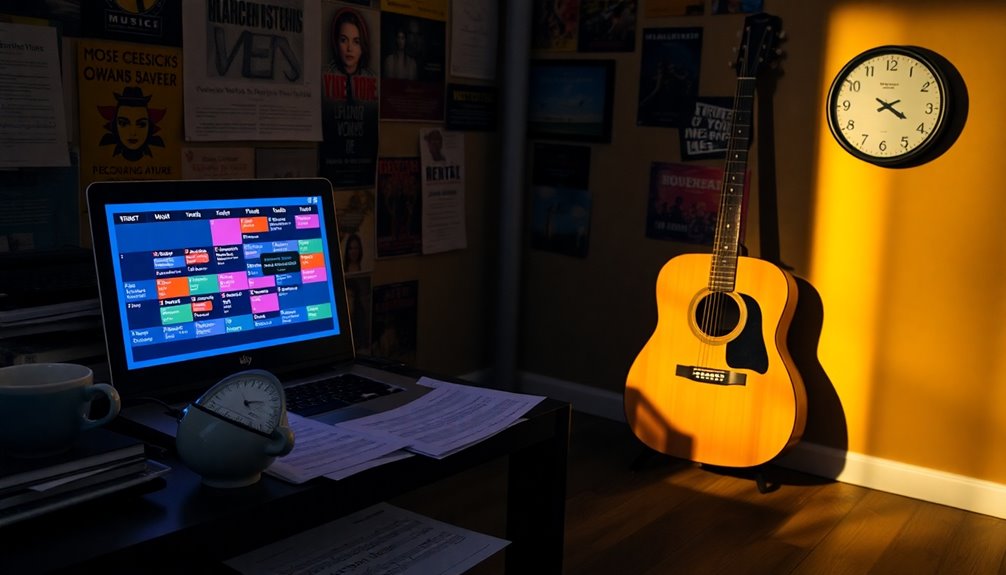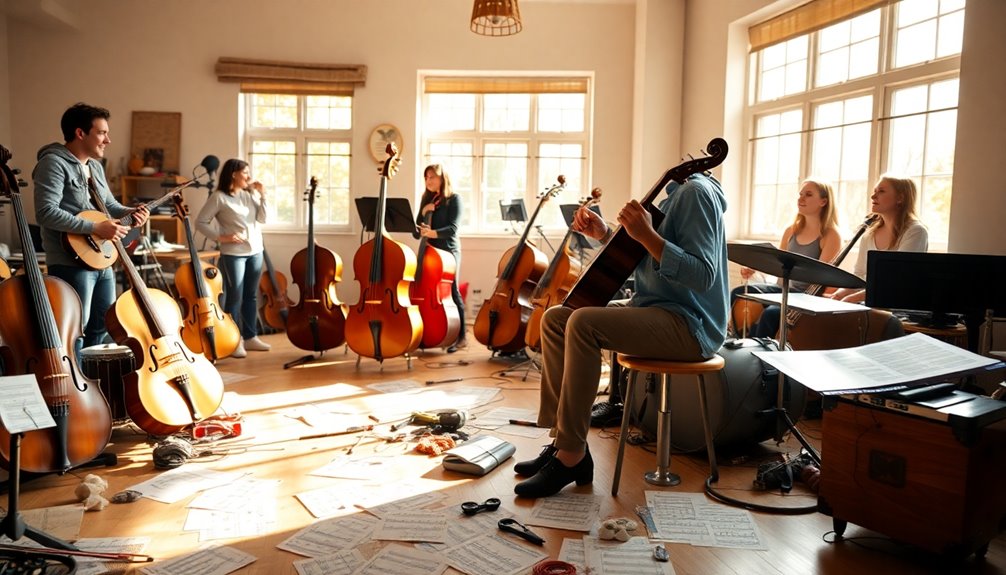Balancing life and practice as a busy musician requires smart strategies. Start by prioritizing tasks like upcoming performances and songwriting. Use the Pomodoro Technique to boost focus and minimize distractions by creating a dedicated practice space. Set specific, achievable goals, and break them into manageable milestones. Evaluate your weekly schedule for practice windows, allowing flexibility for life's unpredictability. Engage with supportive communities to share experiences and find motivation. Finally, integrate music into everyday activities to keep your passion alive. By implementing these hacks, you can harmonize your musical and personal life, and there's more to explore on this journey.
Key Takeaways
- Prioritize urgent tasks and break your day into chunks to manage time effectively for practice and performances.
- Implement the Pomodoro Technique to maintain focus during practice sessions while allowing for necessary breaks.
- Set realistic short and long-term goals, celebrating small achievements to maintain motivation and progress.
- Engage with supportive communities, both online and locally, for encouragement and shared resources.
- Incorporate music into daily activities to seamlessly blend practice with other life responsibilities and enhance creativity.
Time Management Strategies

In the fast-paced world of music, mastering time management can be your secret weapon. As a busy musician, you know how vital it's to carve out time for practice, gigs, and personal life. To maximize your productivity, start by prioritizing tasks. Identify what needs your immediate attention—whether it's preparing for an upcoming performance or working on a new song.
Break your day into manageable chunks, and tackle the most pressing tasks first. This not only keeps you organized but also guarantees you're making progress on what truly matters.
Next, focus on minimizing distractions. In a world full of notifications and interruptions, it's easy to lose sight of your goals. Create a dedicated practice space where you can immerse yourself fully in your craft. Turn off your phone or use apps that block distracting websites during your practice sessions.
This allows you to concentrate better, ultimately leading to more effective practice time. Consider implementing the Pomodoro Technique, where you work in focused bursts of 25 minutes followed by a short break. This method not only enhances your focus but also helps you maintain energy throughout your sessions. Incorporating a structured daily practice schedule can further enhance your time management by ensuring you dedicate specific periods to different aspects of your playing.
Setting Realistic Goals

Setting realistic goals is essential for a busy musician looking to navigate the demands of their career effectively. By focusing on goal setting, you can create a clear path through the chaos of rehearsals, gigs, and personal life.
Start by defining what you want to achieve in both the short and long term. It's vital to break these aspirations down into achievable milestones that serve as stepping stones toward your bigger dreams.
For instance, if you aim to master a new piece, instead of setting an overwhelming goal of perfection, target specific sections each week. This approach not only reduces anxiety but also fosters a sense of accomplishment as you tick off each milestone. Remember, every small success builds momentum toward your larger objectives.
Moreover, keep in mind that flexibility is key. Life as a busy musician can be unpredictable, so be prepared to adjust your goals as necessary. This doesn't mean abandoning them; instead, it's about aligning your aspirations with your current reality.
Celebrate your progress, no matter how small, and don't hesitate to seek support from fellow musicians who understand your journey. Incorporating consistent practice habits into your routine can significantly enhance your growth and help you stay on track.
Ultimately, setting realistic goals helps you maintain motivation and a sense of purpose. By crafting your path with achievable milestones, you foster not only personal growth but also a sense of belonging within your musical community.
Creating a Practice Schedule

Finding time to practice amidst a busy schedule can feel like an uphill battle, but creating a structured practice schedule can transform your routine into a productive and fulfilling experience. By prioritizing your practice duration and incorporating flexible scheduling, you'll find it easier to commit to your musical development without sacrificing other important aspects of your life.
Start by evaluating your weekly commitments and pinpointing potential practice windows. Here's a simple table to help you visualize your time:
| Day | Available Time | Practice Duration |
|---|---|---|
| Monday | 5 PM – 7 PM | 1 hour |
| Tuesday | 6 AM – 7 AM | 30 minutes |
| Wednesday | 4 PM – 6 PM | 1.5 hours |
| Thursday | 7 PM – 8 PM | 1 hour |
| Friday | 5 PM – 9 PM | 2 hours |
This table not only keeps you organized but allows for adjustments based on how your week unfolds. Remember, it's okay to swap practice days; flexibility is key. You could also break your practice into shorter sessions, focusing on specific skills or pieces, which can enhance retention and make your practice feel less overwhelming. Incorporating essential flute practice tools into your routine can further streamline your progress.
Ultimately, finding a balance between your music and other responsibilities is essential. By establishing a consistent practice schedule, you're not just allocating time; you're actively investing in your growth as a musician, fostering a sense of belonging in your own journey.
Finding Supportive Communities

Supportive communities can greatly enhance your musical journey, offering encouragement, resources, and valuable connections. By surrounding yourself with like-minded individuals, you can foster a sense of belonging that can propel your growth as a musician.
Whether you're seeking feedback on a new piece or looking for inspiration, these communities can provide the support you need.
Consider exploring both online forums and local groups. Online forums allow you to connect with musicians from around the world, sharing experiences and advice at any hour of the day. Local groups, on the other hand, can provide face-to-face interactions that build deeper relationships.
Here are a few emotional benefits of engaging with these communities:
- Empowerment: You'll feel motivated and empowered by the success stories of others.
- Belonging: You'll find a sense of belonging that can ease feelings of isolation that often accompany the musician's journey.
- Growth: You'll experience personal and musical growth through shared learning and collaboration.
Joining a flute ensemble can also foster teamwork and communication, enhancing both your musical skills and personal development.
Incorporating Music Into Daily Life

Music can seamlessly weave itself into the fabric of your daily life, enhancing your routines and elevating your mood. By integrating music into your everyday activities, you can cultivate a sense of musical mindfulness that transforms mundane moments into opportunities for inspiration.
Whether you're commuting, cooking, or exercising, let music be your companion, creating an atmosphere that resonates with your emotions.
Start by setting aside specific times for spontaneous sessions. Perhaps you can dedicate a few minutes in the morning to play an instrument or sing along to your favorite tracks.
These brief yet impactful moments can serve as a revitalizing break from your busy schedule, allowing you to reconnect with your passion. You'll find that even short bursts of creativity can rejuvenate your spirit and enhance your focus throughout the day.
Also, consider incorporating music into social interactions. Sharing playlists with friends or family can foster deeper connections and create shared experiences.
You might even organize casual jam sessions where everyone contributes their musical talents, building a sense of belonging within your community. Additionally, exploring Disney songs for flute can introduce a playful element to your practice sessions, making them more enjoyable and engaging.
Frequently Asked Questions
How Do I Stay Motivated During Busy Times?
Staying motivated during busy times can be challenging, but it's doable with effective time management and goal setting.
Start by breaking down your larger goals into smaller, manageable tasks. Prioritize these tasks based on urgency and importance. Set specific time blocks for each task, and don't forget to celebrate small wins.
Surround yourself with supportive peers who understand your journey, and remind yourself why you're passionate about what you do.
You've got this!
What Gear Should I Invest in for Efficient Practice?
What gear do you really need for efficient practice? Investing in quality practice tools can make all the difference.
Start with essential equipment like a metronome and tuner to sharpen your skills. A comfortable chair and a music stand can enhance your focus, while a good pair of headphones helps you hear every detail.
How Can I Deal With Performance Anxiety?
Dealing with performance anxiety can be challenging, but you can manage it effectively.
Start by using breathing techniques to calm your nerves; deep, slow breaths help center your mind. Incorporate visualization exercises, imagining yourself performing confidently and successfully. This mental rehearsal builds familiarity and reduces fear.
Are There Apps to Track My Practice Progress?
Imagine your practice sessions as stepping stones across a vast river; each one brings you closer to your goals.
To guarantee you're making progress, consider using apps designed for progress tracking. These tools often include practice reminders, helping you stay consistent and accountable.
How Do I Balance Music With Family Responsibilities?
Balancing music with family responsibilities can feel challenging, but it's doable with the right approach.
Create a practice schedule that includes dedicated family time. By setting specific hours for practice, you allow yourself to be fully present with your loved ones during family moments.
Communicate your schedule with them, so they understand your commitment. This way, you'll nurture both your musical passion and your family relationships, fostering harmony in both areas of your life.
Conclusion
Incorporating these strategies can transform your musical journey. Did you know that musicians who practice consistently for just 30 minutes a day improve their skills considerably faster than those who practice sporadically? By managing your time effectively, setting achievable goals, and finding a supportive community, you'll not only enhance your practice but also create a fulfilling balance in your life. Remember, it's about quality and consistency, not just quantity. Embrace these hacks and watch your musical growth soar!






